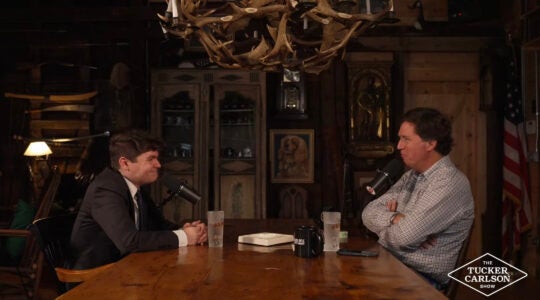PARIS (JTA) — Josh Dolgin didn’t set out to kick Yiddish music into the 21st century.
But there’s no denying that the 34-year-old musician’s beguiling blend of ‘70s-style funk, hip-hop beats, traditional Chasidic melodies and klezmer has been an electric addition to the Jewish music scene.
On July 11, Dolgin, who performs under the name DJ SoCalled, drew a sold-out crowd of bubbes and hipsters to Cafe de la Danse, a 500-seat venue in Paris.
Dolgin, who lives in Montreal, is popular in France. In North America, he says, there’s a greater pressure for music to be easily categorized, and identity politics is a game he doesn’t want to play.
“America? Forget about it — if you’re not dressed up like a rabbi singing reggae, then Jews don’t want anything to do with you and non-Jews don’t want anything to do with you,” he told JTA. “People want to put you in a little rack on the iTunes store.”
Growing up near Ottawa, Dolgin played piano and dabbled in various genres — salsa, funk, reggae, even playing with a gospel band as a teen. From there he experimented with beats, drum machines and sampling.
That’s how he stumbled upon the world of Yiddish theater music.
“It was weird to always sample funk and African-American music, which is where hip-hop comes from, but it’s not where I come from,” he said.
Though Dolgin grew up aware of his Judaism — celebrating holidays, having a bar mitzvah and attending synagogue — he was never plugged into Yiddish culture. But as a musician he was always looking for “cool sounds,” and Dolgin said that Yiddish theater music provided that in spades — “in between the verses are these sort of funky, rhythmic, orchestral breaks that were ideal for sampling.”
“Yiddish culture has been lost and forgotten, and it’s not popular for Jews in North America. They forgot how funky they were,” he said. “In a way, I’m sort of the godfather of mixing it with beats.”
The name of SoCalled’s first album — “Ghetto Blaster,” released in 2007 — has a dual meaning. Yes, it refers to boom boxes, but Dolgin also was urging communities around the world to interact with each other in a broader, deeper way.
“It was about blasting out of the ghetto, out of our ghettos of style, ghettos of community,” he said. “It doesn’t matter who we are. We can learn from each other’s histories and share it.”
For his next album, the recently released “Sleepover,” Dolgin put politics aside and decided to focus on an album of catchy pop songs, no more and no less.
“In France, it’s, ‘Oh look you’re Jewish, you’re a Jewish rapper.’ I’m just a rapper. I’m just a producer. I’m just a piano player,” he said. “I’m Jewish, I’m bald, I’m Canadian … That adds to your appreciation of the art, but it doesn’t necessarily give you a better understanding of where the artist is coming from.”
His music has resonated with young French Jews like Noam Morgansztern, who said the mix of old and new sounds perpetuates Yiddish culture in an appealing way.
“He doesn’t say first that it’s Jewish,” Morgansztern said. “He says first that it’s music.”
And Dolgin’s audiences attract many non-Jews, like Rebecca Touboul, who made the three-hour trip from Marseille to attend the Cafe de la Danse show.
“I don’t really know klezmer. I just like the beat,” she said. “When I heard his first album, I loved it.”
Cafe de la Danse normally hosts indie acts and DJs specializing in house music, but booking an artist like Dolgin is a way to guarantee a full house, said Cyril Bahsief, who works at the venue and organized the show.
“We expected to touch all audiences – hip-hop and klezmer and jazz audiences,” he said. “The concert was just magic.”
Dolgin’s live show is energetic. Dressed in red pajamas, he darts in and out of French and English, inviting guest performers on stage for dance and instrumental solos, and asking the audience to help him with a magic trick.
If the grandmothers in the audience are offended by lyrics such as “Girls in their nightgowns/we’re gonna pull their panties down,” they don’t show it.
The crowd demands an encore and keeps singing the lines of Dolgin’s biggest hit, “(These Are the) Good Old Days.”
For Yiddish music — being reimagined by Dolgin and other fusion artists like him — these just might be.
JTA has documented Jewish history in real-time for over a century. Keep our journalism strong by joining us in supporting independent, award-winning reporting.





